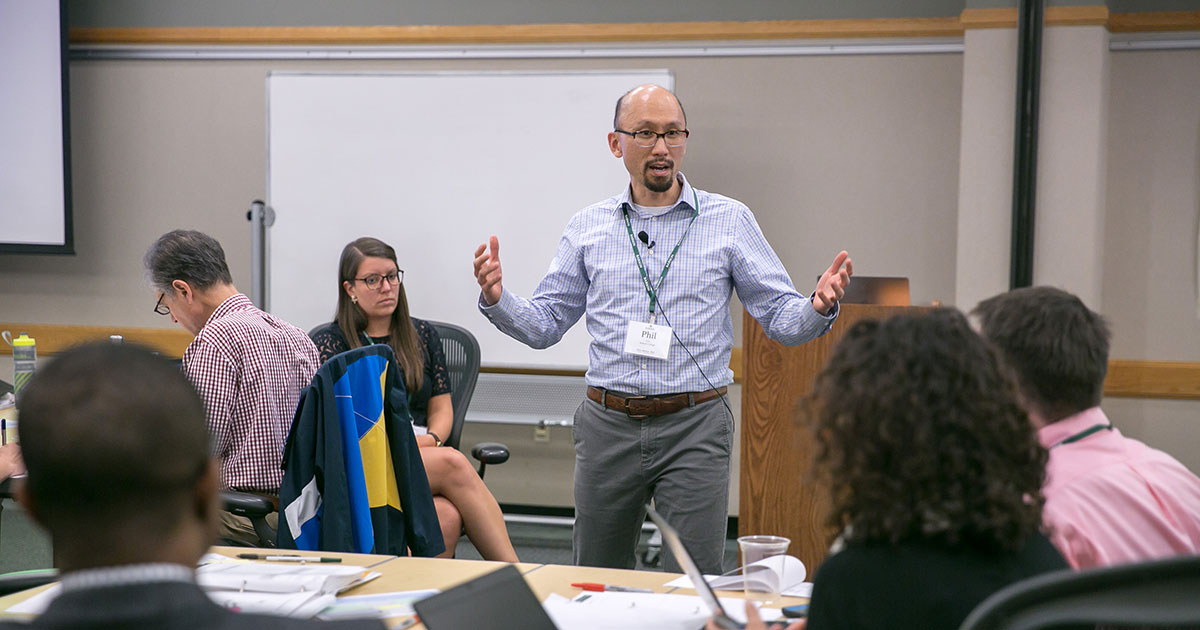The Importance of a Good Entrepreneurial Ecosystem

At Babson College, the entrepreneurial mindset is about more than launching startups in buzzy cities. Here, scholars create more than a sustained, thriving entrepreneurial ecosystem, they drive growth, innovation, and scale up businesses regardless of age or sector, transforming communities in the process.
Assistant Professor Siddharth Vedula and Associate Professor Vincent Onyemah are two such pioneers, spearheading thought leadership around what makes entrepreneurial ecosystems flourish.
An Entrepreneurial Ecosystem and its Impact on Venture Survival
Vedula and Professor Phillip Kim recently published a groundbreaking peer-reviewed article, “Gimme Shelter or Fade Away: The Impact of Regional Entrepreneurial Ecosystem Quality on Venture Survival” in the journal Industrial and Corporate Change. It unearthed quantitative evidence that a firm’s ability to survive hinges on its regional entrepreneurial ecosystem.
In sum, good ideas aren’t enough.
The pair developed a regional entrepreneurial ecosystem quality index, identifying five characteristics most likely to influence a venture’s capacity to survive: supportive entrepreneurial culture; access to finance; human capital; innovation capacity; and formal support organizations. Entrepreneurs can use this index to evaluate potential locations—a game-changing resource when deciding where to launch and expand.
Vedula says that seasoned entrepreneurs can thrive regardless of location.
“Being in a stronger ecosystem does help startups, but it only helps novices. Once you’re into your second, third, or fourth business, basically place does not matter anymore,” he says. “You’ve already internalized all the capabilities you’ll need.”
This revelation has key implications for business leaders, he notes. Being able to create an entrepreneurial ecosystem anywhere—not just, say, Silicon Valley—can lower costs and transform under-the-radar communities.
“You move to some of these ‘higher-quality’ places; your costs also go up a lot,” he says. More important to an entrepreneurial ecosystem than geography, he says, is the presence of innovation hives such as accelerators.
“The culture of a place, the presence of things like incubators and accelerators, are equally important to both novices and serial entrepreneurs, whereas money and skilled labor pools are far more important to novices than serial entrepreneurs,” he says. “If you’re on your fifth business and happen to live in a ‘low-quality’ ecosystem, you could probably substitute for the lack of human capital in your region through your own experience—but you cannot substitute the lack of a supportive culture. That’s a much harder attribute to replace. It’s a rare resource. And, as an entrepreneur, you need to think about the resources you really, really need,” he says.
Participation Is Key to Success
Meanwhile, Onyemah is creating supportive cultures on the ground. He recently returned from Guatemala City, where he spoke to national officials about the success of the Babson Entrepreneurship Ecosystem Platform (BEEP)’s Scale Up implementation in Quetzaltenango, the country’s second-largest city. Professor Daniel Isenberg created the program in 2010 as a tool for regional economic development, focusing on scaling up pre-existing companies in underserved areas.
Join Professors Isenberg and Onyemah for Babson Executive Education’s Driving Economic Growth Through Scale Up Ecosystems program, held March 30-April 1, 2020.
Private sector leaders in Guatemala partnered with BEEP to accelerate the growth of multiple local organizations, including small businesses, family-run firms, and manufacturers. Within two months of launch, a majority of participating companies reported annualized revenue growth from 15% up to 46%.
When building a successful ecosystem, perception is key: As scale-ups succeed, startups also grow, Onyemah says. It’s essential to remember those pre-existing companies.
“When growth happens, when startups are born within an ecosystem that already knows how to grow (businesses), the success rate shoots up. These startups are born into a system that knows what growth is like and how growth can take place. As a result of that, the life expectancy of startups is higher because there are more resources and know-how,” he says. Essentially, rising tides lift all ships.
“That’s why, even though our emphasis at the beginning is on scale-ups, we start seeing startups as well. By then, we have created an ecosystem that is focused on growth,” he says, creating a ripple effect and an economy that can sustain itself.
And, at Babson College, he says, hands-on entrepreneurship intervention is as important as theory.
“We have the ability to go from the academic world into the world of practice and see change happen before our eyes within weeks of intervention. We heard, ‘Thanks to you guys, you came in and changed the face of this region.’ The satisfaction and the pride it gives you is priceless,” Onyemah says.
“That’s Babson. That’s what we do. We have diversity of thought, and we’re not afraid to go from theory to practice quickly and to try things in the real world.”
Posted in Insights



